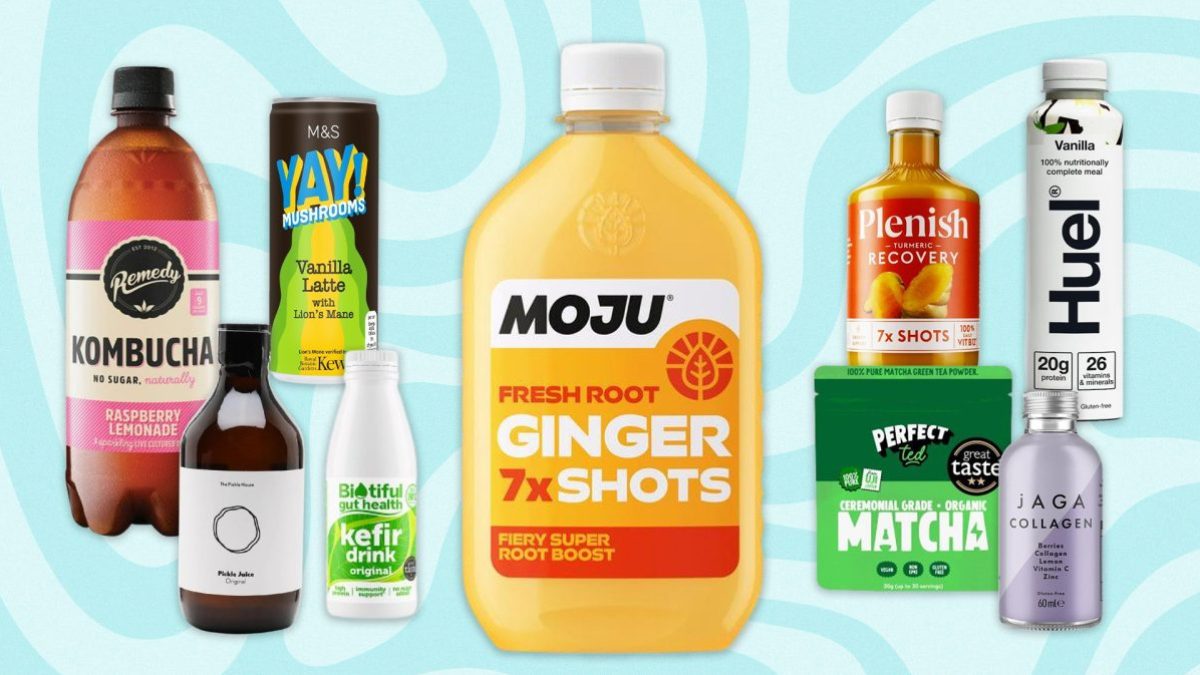A dietitian reviews ginger shots, mushroom coffees and matchas, and finds some worryingly high in sugar
Young adults are ditching cocktails, wine and lattes for so-called ‘functional’ drinks which claim to be transformative to our health.
New data from Ocado Retail has shown a 54 per cent increase in the sales of health drinks, such as matcha tea, kefir, mushroom coffee, ginger shots and kombucha, compared with the previous year.
A survey of 2,200 adults in the UK by Savanta and Ocado found that two in five of us buy functional drinks several times a month, rising to two thirds in Gen Z.
But how healthy are these drinks? Bahee Van der Bor, paediatric dietitian and spokesperson for the British Dietetic Association, gives her verdict on some of the most popular choices.
YAY! Mushrooms Vanilla Latte with Lion’s Mane, M&S, £2 (250ml)
Per 100mls – calories: 43, sugar: 4.4g, fat: 1g, fibre: 0.5g, protein: 2.1g, salt: 0.05g
Mushroom coffee – a blend of coffee and ground mushrooms – is said to have potential health benefits including boosting the immune system and reducing stress, and it contains less caffeine than regular coffee.
EXPERT VERDICT: This drink is 30 per cent coffee, so a can provides the equivalent of a cup of coffee (you shouldn’t exceed 400mg of caffeine a day).
Small studies have found lion’s mane mildly improved cognitive function, but that was based on consuming three grams a day, and it’s unlikely you’d get that dose in this drink.
Also any potential benefits would be lost if you didn’t have it every day.
Mushrooms contain selenium, a mineral which is linked with immune function, but there are no clinical trials showing they help the immune system.
If you want to improve your immune function it’s better to make sure you’re getting enough vitamin C, vitamin D, sleeping well and keeping active.
This drink contains added sugar and the whole can contains 11 grams of sugar (the equivalent of nearly three teaspoons), which would be more than a standard latte.
Rating: 1 out of 5
Biotiful kefir drink, Waitrose, £2.75 (500ml)
Per 100mls – calories: 59, sugar: 2.8g, fat: 2.9g, protein: 3.5g, salt: 0.1g, calcium: 14g
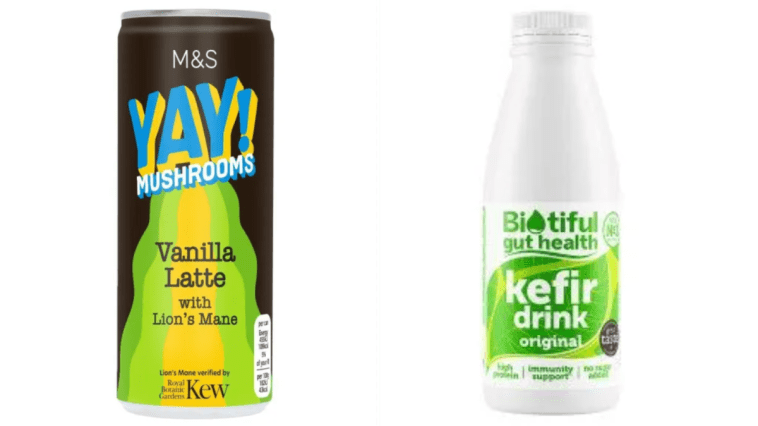 M&S’s YAY! Mushrooms Vanilla Latte and the Biotiful kefir drink
M&S’s YAY! Mushrooms Vanilla Latte and the Biotiful kefir drink
Kefir is a milk drink fermented with live bacteria, which claims to support the immune system, boost gut health and offer a good source of calcium and protein.
EXPERT VERDICT: I’m a fan of kefir. It’s a source of live bacteria, and while at the moment we don’t have strong evidence that kefir alone will improve the gut microbiome (the community of bacteria and viruses that live inside the gut), as part of a nutritious diet including fruit, vegetables and lentils, it can play a role. It may also help in managing some gastrointestinal symptoms such as bloating and diarrhoea.
The fermentation process reduces the final quantity of lactose (milk sugar) in the drink so it could be a good choice for people with lactose intolerance. It only contains a small amount of sugar, which would come naturally from the lactose rather than any added sugar.
Around 150mls would be a good portion as a satisfying snack, or you could use it instead of normal milk with your breakfast cereal.
Rating: 5 out of 5
Remedy Kombucha Raspberry Lemonade, Sainsbury’s, £2.95 (700ml)
Per 100mls – calories: 3, sugar: 0g, fat: 0.5g, protein: 0.5g, salt: 0.01g, fibre: 0.5g
Kombucha is fermented tea and contains live bacteria and polyphenol, an antioxidant, which is said to reduce inflammation in the body.
EXPERT VERDICT: Kombucha is low in sugars and, as part of a balanced diet, it may have a role in supporting good gut health.
Although it is not yet proven, it may have a role in producing short-chain fatty acids in the gut, which help to regulate the immune system, provide energy to the cells lining the colon and support your metabolism.
Any sugar in this drink is used up in the fermentation process so the final quantity is zero.
However, it does contain the sugar alcohol erythritol, which some people with IBS (irritable bowel syndrome) may be sensitive to. It contains a natural sweetener, Stevia, which is a bit better than using artificial sweeteners.
Rating: 4 out of 5
MOJU Ginger Vitality Shots, Sainsbury’s, £5.95 for 420ml (contains seven shots)
Per 100mls – calories: 47, sugar: 8.6g, fat: 0.5g, protein: 0.8g, salt: 0.01g
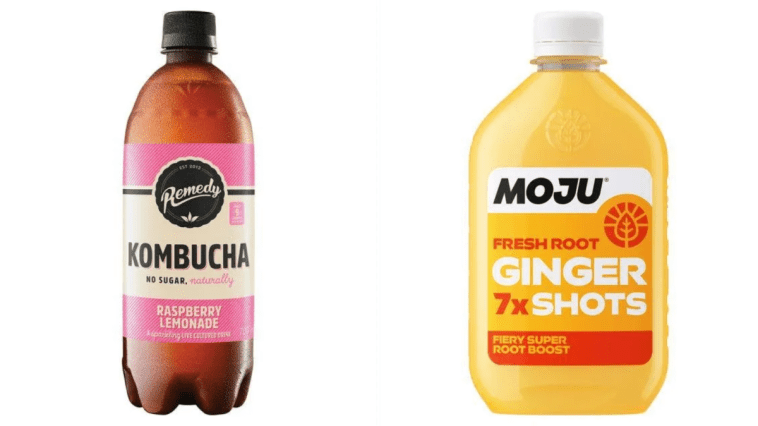 Remedy Kombucha Raspberry Lemonade and Moju Ginger Shots are both sold in Sainsbury’s
Remedy Kombucha Raspberry Lemonade and Moju Ginger Shots are both sold in Sainsbury’s
Ginger shots claim to aid digestion, contribute to the reduction of tiredness and fatigue and the normal function of the immune system.
EXPERT VERDICT: Ginger can be helpful for pregnant women or people going through chemotherapy to reduce nausea, although clinical trials of that benefit are based on a high dose supplement, and you may not get as much in a ginger shot: ginger root only makes up 20 per cent of this shot.
The drink contains vitamin C, which has been proven to reduce tiredness and fatigue and support the immune system. Ginger contains a small amount of vitamin C, but the lemon in the drink would also contribute towards the total amount of vitamin C. Other fruits such as oranges contain more vitamin C than ginger.
This drink contains just over 5g of sugar per 60ml portion, which comes from the fruit juice it contains. You could just cook ginger instead and include it in your diet that way.
Rating: 2 out of 5
Perfect Ted Organic Matcha Green Tea Powder, Waitrose, £10 (30g)
Per serving (1-2g) – calories: 6.5, sugar: 0g, fat: 0g, protein: 0.6g, salt: 0g, fibre: 0.8g
Matcha tea is a type of powdered green tea which is said to be rich in antioxidants, boost metabolism, enhance mood and concentration and improve heart health.
EXPERT VERDICT: Matcha tea is high in antioxidants, which reduce inflammation in the body and can prevent damage to cells caused by free radicals. The other claims aren’t currently backed up.
A small trial suggested that matcha led to changes in the gut microbial composition and could have a role in weight management as part of a healthy, balanced diet.
This brand of matcha tea contains 68mg of caffeine per teaspoon of powder, which is quite a lot.
Matcha powder is often added to normal coffee, so people should be aware that they could end up with a big dose of caffeine.
Rating: 3.5 out of 5
The Pickle House Original Pickle Juice, the Pickle House UK, £16 (2 x 500ml bottles)
Per 100ml – calories: 20, sugar: 3.2g, fat: 0.4g, protein: 0.4g, salt: 2.4g, fibre: 0g
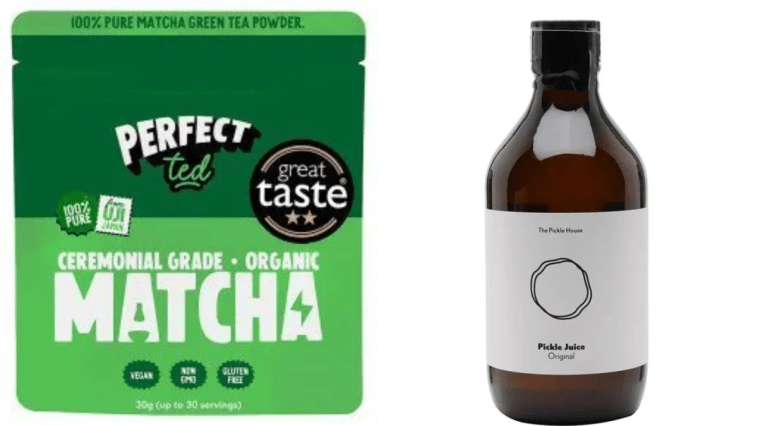 Perfect Ted Organic Matcha Green Tea Powder and The Pickle House UK’s juice
Perfect Ted Organic Matcha Green Tea Powder and The Pickle House UK’s juice
Pickle juice is said to relieve muscle cramps, boost gut health and aid hydration.
EXPERT VERDICT: A very small study in 2010 showed that pickle juice could reduce exercise-induced muscle cramps.
I’d advise having very small amounts, the size of a shot, if you suffer from cramps after exercising.
It’s very high in sodium, which means it isn’t suitable as an everyday drink. People with high blood pressure should be very careful about trying high-sodium products like this.
Rating: 2 out of 5
Plenish Turmeric Recovery Shots, Sainsbury’s, £6, 420ml (contains seven shots)
Per 100ml – calories: 43, sugar: 8.2g, fat: 0g, protein: 0.7g, salt: 0g, fibre: 0.5g
These shots are also made with ginger and orange juice and claim to support energy levels and overall well-being thanks to containing vitamin B12. Turmeric is said to be high in antioxidants, which has an anti-inflammatory effect, and to aid with joint pain.
EXPERT VERDICT: Some studies show turmeric helps with muscle recovery (athletes consumed 60ml shots after matches each day) and curcumin – a chemical found in turmeric – supplements helped manage symptoms of osteoarthritis and joint pain in clinical trials. But you wouldn’t find that dose in a shot.
It contains 2.5 micrograms (mcg) of vitamin B12 per 60 ml but that will only make a difference to tiredness and fatigue levels if you are lacking in vitamin B12 in the first place. Most people already have enough.
Turmeric is rich in antioxidants but I’m not convinced by having it in a daily drink.
Rating: 3.5 out of 5
Huel Ready-to-Drink Complete Meal – Vanilla, Tesco, £3.50 (500ml)
Per 100ml – calories: 80, sugar: 0.9g, fat: 3.8g, protein: 4g, salt: 0.1g, fibre: 1.2g
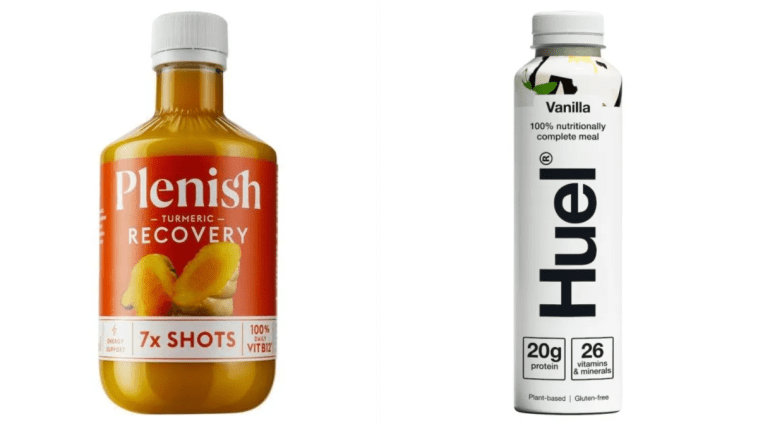 Plenish Turmeric Recovery Shots and Huel’s Complete Meal drink
Plenish Turmeric Recovery Shots and Huel’s Complete Meal drink
Each bottle claims to be a 100 per cent nutritionally complete meal, packed with 26 essential vitamins and minerals. Manufacturers say it has 172 health benefits, including reduced fatigue, immune and digestive support, and helping to grow and maintain muscle mass.
EXPERT VERDICT: I would never recommend a meal replacement. It’s really important to eat your food, chew your food and break down the food slowly because digestion starts in the mouth. When you have a drink, all the nutrients are already broken down to some extent, and sugar is released more quickly into the bloodstream.
I would only recommend a meal replacement for the purpose of weight gain and growth in people who need oral nutrition. For people who are weight training and need additional protein, I’d advise getting a protein powder or supplement instead.
Rating: 2.5 out of 5
